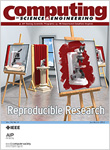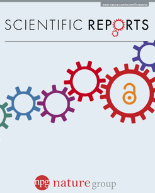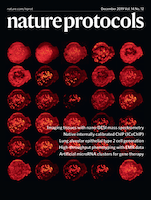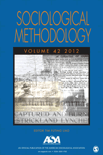
Nature Reviews Methods Primers
Scope & Guideline
Elevating research standards with cutting-edge methodology overviews.
Introduction
Aims and Scopes
- Methodological Advancement:
The journal focuses on the development and refinement of scientific methods across disciplines, ensuring that researchers have access to the latest techniques and advancements. - Interdisciplinary Approaches:
Nature Reviews Methods Primers encourages contributions that bridge multiple fields, showcasing how methodologies can be applied across different scientific domains. - Practical Guidance and Protocols:
Each primer is designed to provide practical, step-by-step guidance on implementing specific methodologies, making it easier for researchers to adopt new techniques in their work. - Emphasis on Reproducibility:
The journal highlights the importance of reproducibility in research, advocating for transparent methodologies that can be reliably replicated by other scientists. - Focus on Emerging Technologies:
Nature Reviews Methods Primers often features primers on cutting-edge technologies, addressing the needs of researchers working with novel tools and techniques.
Trending and Emerging
- Single-Cell Analysis Techniques:
The increasing focus on single-cell methodologies, such as single-cell RNA sequencing and spatial omics, illustrates the growing interest in understanding cellular heterogeneity and its implications in various biological contexts. - Nanotechnology Applications:
There is a significant rise in primers related to nanotechnology, including nanozymes and nanomaterials, showcasing their expanding role in healthcare, diagnostics, and environmental applications. - Machine Learning and Data Analysis:
The integration of machine learning techniques in experimental design and data analysis is a trending theme, as researchers seek to leverage computational tools for enhanced insights and predictions. - Bioprinting and Tissue Engineering:
Emerging themes in bioprinting and engineered tissues reflect advancements in regenerative medicine and the growing need for innovative solutions in healthcare. - Environmental and Sustainable Methods:
An increasing number of primers are focusing on sustainable practices and environmentally friendly methodologies, driven by global challenges and the push for greener science.
Declining or Waning
- Traditional Analytical Techniques:
There has been a noticeable decrease in primers discussing traditional techniques such as basic chromatography and spectrometry, as researchers increasingly turn to more advanced and automated methods. - Basic Laboratory Techniques:
Topics covering fundamental laboratory skills and techniques are becoming less frequent, as the focus shifts towards sophisticated methodologies that integrate technology and automation. - Generalized Protocols:
There is a decline in the publication of generalized protocols that do not cater to specific applications or fields, with a growing preference for detailed, application-focused primers.
Similar Journals

COMPUTING IN SCIENCE & ENGINEERING
Bridging Theory and Application in Computing.COMPUTING IN SCIENCE & ENGINEERING, published by the IEEE Computer Society, is a leading journal dedicated to bridging the gap between computing principles and practical applications in the realms of science and engineering. With an impact factor that reflects its strong reputation, this journal is essential for researchers, professionals, and students seeking to explore the latest developments as well as interdisciplinary collaborations in computing. Since its inception in 1999, the journal has undergone many transformations to remain at the forefront of innovation, with a converged publication range extending through 2024. It is categorized in the Q2 quartiles for both Computer Science and Engineering, demonstrating its significance in these fields, as evidenced by its Scopus rankings, placing it in the top 30% of general engineering and computer science journals. As part of the open-access movement, readers are encouraged to engage with cutting-edge research, fostering a deeper understanding and application of computing in various scientific disciplines. Discover the latest findings and contribute to advancing knowledge in this dynamic and critical area of study.

Scientific Data
Connecting Researchers with High-Quality Data ResourcesScientific Data, published by NATURE PORTFOLIO, is a premier open-access journal that has been providing researchers with a platform to share high-quality data across various interdisciplinary fields since 2014. With its E-ISSN 2052-4463, the journal has established itself in the United Kingdom and gained global recognition. As of 2023, it has achieved remarkable quartile rankings, being placed in Q1 across several categories including Computer Science Applications, Education, Information Systems, Library and Information Sciences, and Statistics and Probability. These rankings highlight its pivotal role in advancing data sharing and methodologies, which are critical to fostering innovation and collaboration in research. The journal’s strong Scopus rankings, with top positions in Mathematics, Decision Sciences, and Social Sciences reinforce its importance as a key resource for academics, professionals, and students seeking to utilize and contribute to the rich ecosystem of scientific data. With open access options, Scientific Data empowers a diverse audience to engage with the latest research findings and datasets, ensuring that invaluable insights are accessible to all.

European Journal for Philosophy of Science
Exploring the Foundations of Scientific ThoughtThe European Journal for Philosophy of Science, published by SPRINGER, stands as a prestigious platform for scholars in the realms of philosophy and history of science. With an impressive impact factor and categorized in the Q1 Quartile for both History and Philosophy of Science and Philosophy, this journal ranks among the top 10% of its peers, reinforcing its critical role in advancing academic discussions and insights within these fields. With its composition of rigorous peer-reviewed articles and a commitment to fostering interdisciplinary dialogue, the journal navigates foundational and contemporary issues that shape scientific inquiry. Although currently not Open Access, it provides invaluable access to researchers, professionals, and students who seek to deepen their understanding of the philosophical underpinnings of scientific practice. Housed in the Netherlands, the journal continuously engages with the evolving landscape of philosophy in the scientific domain, making it a key resource for anyone invested in the intersection of science and philosophy.

Nature Reviews Disease Primers
Bridging Research and Practice in MedicineNature Reviews Disease Primers, published by NATURE PORTFOLIO, stands as a leading journal in the field of Medicine, specifically recognized for its comprehensive coverage of various diseases and health-related topics. With an impressive impact factor that reflects its high citation rate, this journal is categorized within the Q1 quartile in Medicine (miscellaneous) and holds a prestigious Scopus rank of #4 out of 636, placing it in the 99th percentile of general medicine publications. Launched in 2015 and projected to continue its influence until 2024, the journal aims to bridge the gap between clinical research and practical application, providing easy-to-digest primers that summarize current understanding and emerging trends in various diseases. While not classified as open access, its rigorously peer-reviewed content remains crucial for academic researchers, healthcare professionals, and students alike, striving to stay at the forefront of medical knowledge. The journal's base in the United Kingdom enhances its global reach, contributing to the ongoing dialogue in the medical community.

Scientific Reports
Pioneering Open Access for Global Scientific Progress.Scientific Reports, published by the esteemed NATURE PORTFOLIO, is a prominent multidisciplinary journal that has been making significant strides in scientific communication since its inception in 2011. With an impressive impact factor and ranked in the Q1 category of multidisciplinary journals, it holds a respected position, placing it at #14 out of 171 according to Scopus rankings, reflecting its high citation rates and robust academic contributions in the 92nd percentile. The journal operates under an Open Access model, enabling broad dissemination of research findings and advancing scientific knowledge globally. Based in the United Kingdom, with offices in Germany, Scientific Reports is committed to publishing high-quality, peer-reviewed research across diverse fields, catering to the needs of researchers, professionals, and students alike, fostering collaboration and innovation in the scientific community.

STAR Protocols
Unlocking New Frontiers in Scientific ProtocolsSTAR Protocols, published by Elsevier, is an esteemed open access journal that has been at the forefront of providing innovative experimental protocols since its inception in 2020. With a distinct focus on a range of scientific disciplines including Biochemistry, Genetics and Molecular Biology, Immunology and Microbiology, and Neuroscience, this journal serves as a vital resource for researchers, professionals, and students alike. The journal holds a commendable status, reflected by its Q1 and Q2 rankings across various relevant categories, ensuring the dissemination of high-impact research methods and findings. With its open access format, STAR Protocols encourages a broad readership and facilitates the sharing of pivotal knowledge in the scientific community, driving forward the culture of transparency and collaboration in research. Positioned in the vibrant academic landscape of the United States, it steadily contributes to the evolution of experimental methodologies, fostering innovation across disciplines.

Nature Protocols
Transforming Methodologies for Tomorrow's ResearchNature Protocols, published by NATURE PORTFOLIO, is a premier academic journal specializing in the dissemination of innovative and practical experimental methodologies in the vast field of biochemistry, genetics, and molecular biology. With an impressive Scopus rank of #5 out of 221 journals and a 97th percentile status, it stands firmly in the Q1 quartile, reflecting its integral role in advancing scientific knowledge. Established in 2006, this journal provides an invaluable resource for researchers and practitioners aiming to refine their experimental techniques, ultimately driving forward the frontiers of life sciences. While currently operating under a subscription model, the journal continues to be a pivotal platform for sharing high-quality, peer-reviewed protocols that facilitate reproducibility and transparency in research. Addressing a global audience from its base in the United Kingdom, Nature Protocols is dedicated to fostering collaboration and innovation, making it indispensable for professionals and students engaged in cutting-edge scientific endeavors.

Jove-Journal of Visualized Experiments
Making Science Visible for EveryoneJove - Journal of Visualized Experiments, with ISSN 1940-087X, is a pioneering journal dedicated to publishing high-quality visualized research across a diverse array of scientific disciplines, including biochemistry, genetics, molecular biology, chemical engineering, immunology, microbiology, and neuroscience. Established in 2006 and published by the Journal of Visualized Experiments, this journal plays a crucial role in advancing research methodologies by allowing scientists to share their experimental procedures through visual means, thereby enhancing reproducibility and accessibility. With a Q2 classification in Chemical Engineering and several Q3 rankings in related fields as of 2023, Jove serves as a vital resource for researchers looking to disseminate complex experimental techniques clearly and effectively. Although the journal operates under traditional access models, it is committed to fostering an open exchange of knowledge, making it invaluable for students, professionals, and researchers eager to stay at the forefront of scientific innovation.

Sociological Methodology
Shaping contemporary discourse with cutting-edge techniques.Sociological Methodology is a premier journal published by SAGE Publications Inc that serves as a vital platform for advancing the field of sociology through innovative methodological approaches. Since its inception, this esteemed journal has provided a rigorous forum for empirical and theoretical contributions in sociological research, making it an essential resource for both established scholars and emerging researchers. With an impressive Q1 ranking in both Social Sciences and Sociology and Political Science, as well as a notable position in the Scopus rankings, the journal ensures that published works meet the highest academic standards. Although it does not offer open access, its contributions have a significant impact on the field, and it enriches interdisciplinary dialogues through its diverse scope. The journal emphasizes the importance of methodological rigor and the application of cutting-edge techniques to address complex social issues, thereby shaping contemporary sociological discourse. Located in the United Kingdom, Sociological Methodology is dedicated to fostering scholarly communication and driving forward innovative research that challenges conventional paradigms.

Journal of Computational Methods in Sciences and Engineering
Exploring the Intersection of Theory and Practical ApplicationWelcome to the Journal of Computational Methods in Sciences and Engineering, published by IOS PRESS in the vibrant academic landscape of the Netherlands. With a dedicated focus on advancing the application of computational techniques across various domains, this journal serves as a vital platform for researchers, professionals, and students alike. Although it resides in the Q4 category across key disciplines such as Computational Mathematics, Computer Science Applications, and Engineering, the journal aims to foster innovation and disseminate emerging trends in computational methodologies. Despite its current ranking, the journal’s mission is to facilitate a dialogue on pioneering approaches and their practical implications, supporting the growth and evolution of computational sciences. With a publication history that spans from 2001 to 2024, we invite contributions that reflect scientific rigor and creative solutions to complex engineering challenges, reinforcing our commitment to bridging theory and practice in this dynamic field.